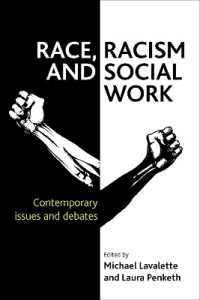Full Description
This book presents an empirical study that develops and validates a learning-oriented self-assessment instrument for assessing the strategic competence (SC) of young language learners in oral communication, specifically within the context of early English education in China.
The instrument's development followed a multi-phased research design, encompassing three interconnected stages: conceptualisation, operationalisation and validation. Each phase employed distinct methods, data collection techniques and analyses tailored to specific research objectives. By adopting an integrative approach, this book clarifies the crucial yet elusive concept of SC. It not only contributes to the field of language assessment but also underscores the importance of explicit SC instruction in language education for young learners.
Focusing on real-world classroom scenarios and offering practical solutions for integrating SC instruction into current teaching paradigms, this book will appeal to educators, researchers and policymakers interested in language testing and assessment, foreign language education and applied linguistics.
Contents
1 Assessing young language learners: Construct, method and context 2 Working towards an integrative conceptualization of strategic competence: A review of literature 3 Instrument development for assessing oral strategic competence of young language learners: Considerations and methods 4 Validation I: Evaluating, piloting and prototyping 5 Validation II: Field testing 6 Validation III: Synthesis, inferences and decisions 7 Implications and recommendations







